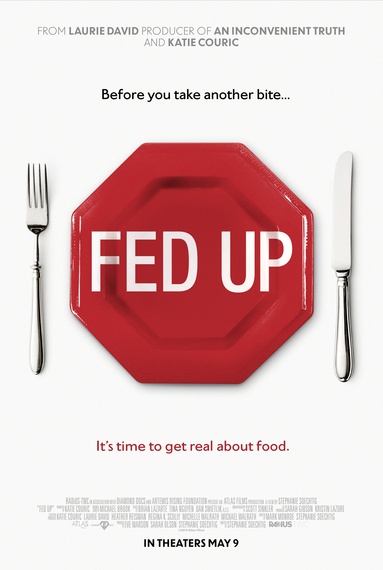
Every once in a few years, a documentary about food captures the public's imagination and inspires people to make changes in their lives and in our food environment. The latest, and perhaps the most strategic, of these is Fed Up, the film about food industry's contribution to obesity produced by Laurie David and narrated by Katie Couric, which is out in theaters on May 9. In the same way Super Size Me changed the way Americans think about fast food, Fed Up has the potential to change the way Americans think about sugar -- particularly the sugar we consume in soda and other sugar-based drinks.
Soda and sugary drinks are actually the largest single source of calories in the American diet, accounting for about 7 percent of our energy intake. It's certainly true, as Fed Up makes clear, that so many of our foods have added sugar. But soda, energy drinks, "fruit" drinks, sweetened teas, and other sugar drinks make up almost half of Americans' consumption of added sugars. So any serious conversation about reducing obesity and diabetes has to start by addressing the role soda plays in our diets -- and that soda companies play in public debates on matters of nutrition policy.
For years, soda companies have tried to convince Americans that managing one's weight is solely a matter of personal responsibility -- a simple matter of balancing the calories that come in from eating and drinking with the calories that go out in the form of exercise. Last year, Coca-Cola released commercials suggesting that the company is "part of the solution" to the obesity epidemic, and that any calories -- no matter the source -- consumed without the balancing exercise will lead to weight gain. Another Coke spot communicated that the calories in soda could be "balanced" away with dog-walking, bowling, or even prolonged laughing.
But as physician Robert Lustig emphasizes in Fed Up, the calories in soda are most certainly not equivalent to the calories in almonds, say. Unlike most foods, soda provides nothing of value to the diet, only increased risk of disease. Each additional sugar drink consumed per day increases a child's risk of obesity by 60 percent. Drinking just one or two sugary drinks per day increases one's risk of developing Type 2 diabetes by 25 percent. Soda has even been linked to heart disease, with one study showing that each soda consumed per day increases a man's risk of heart disease by 19 percent.
Nor is physical activity the panacea, as Coca-Cola would have us believe. "We are not going to exercise our way out of this obesity problem," is how my CSPI colleague Margo Wootan puts it in the film. "To burn off the calories in one 20-ounce Coke, a child would have to bike for an hour and 15 minutes."
I hope all Americans watch Fed Up. But the people who really need to see this film are city councilors, mayors, governors, and members of Congress. We're celebrating the launch of the film by urging Americans to demonstrate their support for soda taxes. Taxing soda would be an effective and fair way to raise money for health promotion, to defray some of the costs of soda-related diseases, and to modestly reduce consumption, particularly among young people. The soda industry has spent lavishly to defeat soda taxes everywhere they've been proposed. (In the U.S., at least; Mexico recently enacted a peso-per-liter tax on sugar drinks.) At some point, though, the need for new revenue to pay for health care costs is going to overcome the soda industry's spin and spending. When that time comes, the release of Fed Up will be seen as one of the catalysts for change. Find a theater near you screening the film here.
